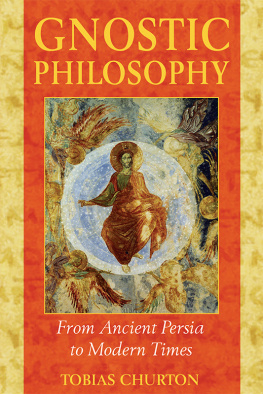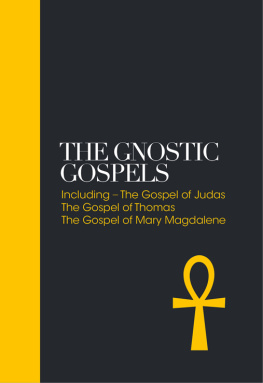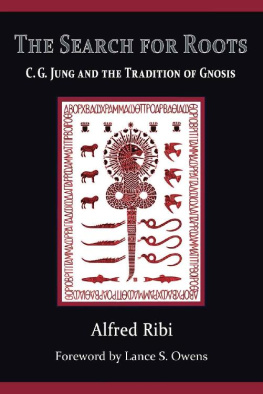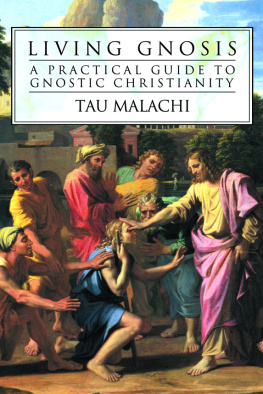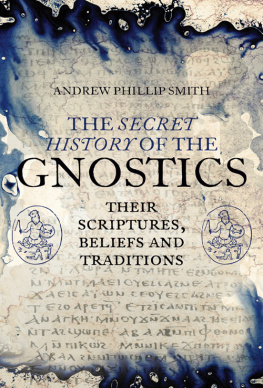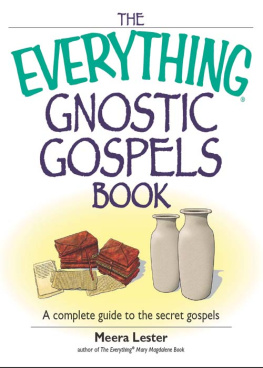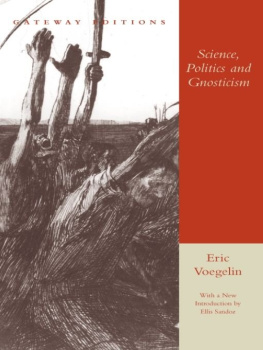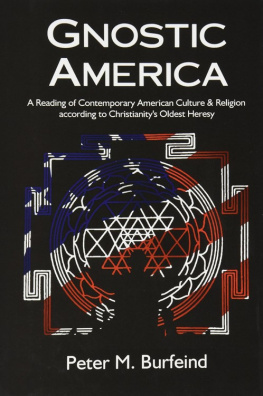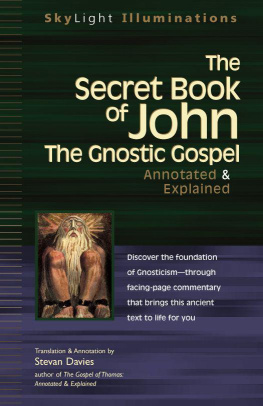GNOSTIC
PHILOSOPHY
From Ancient Persia to Modern Times

TOBIAS CHURTON

Inner Traditions
Rochester, Vermont
Spiritual values we know;religious values we can only guess at.
M ICHAEL P OWELL TO G AVIN M ILLAR , BBC A RENA , 1980
Acknowledgments
T his book could not have been written without the superb facilities of the Bibliotheca Philosophica Hermetica (J. R. Ritman Library, Amsterdam). I am also indebted to help received from my mother and father, Victor and Patricia Churton, and from Ms. Sarah Miller.
For permission to study the Yorke Collection at the Warburg Institute, I am deeply grateful to the former library curator, Dr. William Ryan. For a series of sparkling interviews, I am likewise indebted to Professors Hans Jonas, Gilles Quispel, Elaine Pagels, and R. McLachlan Wilson, and to the late Dr. Kathleen Raine. Special thanks are also due to Art Schiemann, director of the Warmonderhof Anthroposophical Farm in Holland, for showing me how spirit and nature work together.
The chapter on the Knights Templar benefited greatly from the detailed knowledge of the Masonic historian Matthew Scanlan.
The friendship, encouragement, good humor, original scholarship, and fraternal guidance of Christopher McIntosh have been central to the long gestation and fruitful birth of this work. In particular, part 3 (Enlightenment) owes everything to Dr. McIntoshs pioneering work in what was the dusty attic of eighteenth- and nineteenth-century Freemasonry and occultism.
Special thanks are due to my special agent, Tuvia Fogel, for his patient faith.
This book has been a long time in coming. There has been turmoil and heart searching. There have also been luminous helpers on the way. I thank God for the friendship of the late bishop of Vxj (Sweden), Professor Jan Arvid Hellstrm (who died in a car accident just as we had begun to formulate Stone Theology).
Enormous gratitude is due again to my parents, Victor and Patricia Churton, and to Julian Jones, Philip Wilkinson, Caroline Wise, Columba Powell, Sally de Beaumont, Patrick and Karla Hickman-Robertson, Thelma Schoonmaker-Powell, Vanilla Beer, Steve George, Andrew Brown, Jean Gimpel, David and Belinda Parsons-Scott, Jim, Gay, and Pattie Parsons, Brian Averill, the late Robert J. Bob Vincent, Peter Maxwell-Jones, and Doug and Hilary Pickford; all have encouraged, helped, and indulged my own particular madness.
Behind every great book is a great woman; without Joanna Churton, this work would not have been completed.
Contents




Foreword
G nostic Philosophy is a book that speaks to the condition of our age. If ages correspond to metals, as certain of the ancient Greeks thought, then this is an age of lead, the metal of Saturn. We are ripe for a transmutation. For the alchemist, the gleam of precious metal in the depths of the earth is analogous to the gleam of the divine spirit held captive in the physical realm, as the gnostic puts it.
At the core of Gnosticism lies a powerful metaphor: There is not one creator but two, one true, the other false. The false one, the Demiurge, keeps our spirits captive in the world of matter, away from the divine light above. Yet through the ages, a tradition of knowledge has been handed down, veiled in imagery and symbol, telling us where we came from and how we can find our way back. This knowledge, or gnosis, can set our spirits free if we are receptive to it.
In speaking of this worldview, I use the word metaphor deliberately because, like the author of this book, I believe that much mischief has been caused by taking it in a literal and physical sense, as many present-day gnostics and scholars of Gnosticism continue to do. One of Tobias Churtons most interesting arguments is that this literal interpretation is a distortion or parody of the true gnosis, stemming arguably from a misunderstanding of early Gnostic writers such as Valentinusyet it was the parody that came to be generally signified by the word Gnosticism. Hence, writers such as Plotinus attacked the Gnostics because, as Churton puts it, some of them had got hold of an excellent stick and caught the wrong end of it.
If, however, the dualistic worldview of the Gnostics is taken as a spiritual metaphor, it becomes a powerfully transforming message: All of us are spiritually less than we could be, but we have somewhere within us the knowledge of how to raise ourselves up toward the stars. Seen in this perspective, the Demiurge becomes, in Churtons words, the world-making perceptual faculty of human beings, which tries to be God and thus hinders the spirit from communion with the true God.
The metaphor of Gnosticism opens up another possibility, which is to view the world as a jest or a kind of conjuring trick, with the Demiurge as the conjuror whose skill we admire, knowing that sooner or later the show will end and we shall leave the theater. With this viewpoint, Gnosticism ceases to be a negative, melancholy worldview and becomes instead a playful, celebratory one. If the world is a trick or a jest, why not play along with it as with a party game? Perhaps this is ultimately the way to transcend it.
The Dutch historian Huizinga, in his classic book Homo ludens, deals with playfulness and its importance in human culture throughout history. This spirit of playfulness is, I believe, an important vein running through the gnostic tradition. It is the same phenomenon we find among certain Buddhist sages, who cultivate humor as one path to enlightenment. Thus, there has always been, in both East and West, the tradition of the laughing master. Churton mentions an early example in the figure of the Samaritan Simon Magus.
When I wrote my own book on Rosicrucianism, which is one aspect of the gnostic tradition, I did not take into account the importance of this quality of playfulness. Hence, I failed to appreciate the real significance of the word ludibrium, or jest, which Johann Valentin Andreae used to describe his work The Chemical Wedding of Christian Rosenkreuz, one of the key early Rosicrucian documents. Only later did it strike me that Andreae intended the word ludibrium in the spirit of Homo ludens, and that the same spirit runs through much of Rosicrucianism. This thought struck me again when I read Churtons illuminating chapters on the Rosicrucians in this books companion, The Golden Builders. In that book, Churton skillfully places the Rosicrucians in the context of the emerging gulf between science and religion, a gulf they wished to bridge by creating a universal system of knowledge linking religion, science, philosophy, and art. The Rosicrucians embodied this vision in a brilliantly created mythology with a strong element of playfulness. This playful spirit informs The Gnostic Philosophy as well.
One of the more recent laughing masters featured in this book is Aleister Crowley, whose path was through sex and humor, neither of which find favor in the West when combined with religionhence the vilification that has been heaped on Crowleys head. When we rediscover the spirit of Homo ludens, perhaps we shall look more kindly on the Great Beast. Meanwhile, Churtons affectionate and perceptive treatment of Crowley is a valuable corrective to much misunderstanding about him.
Next page
